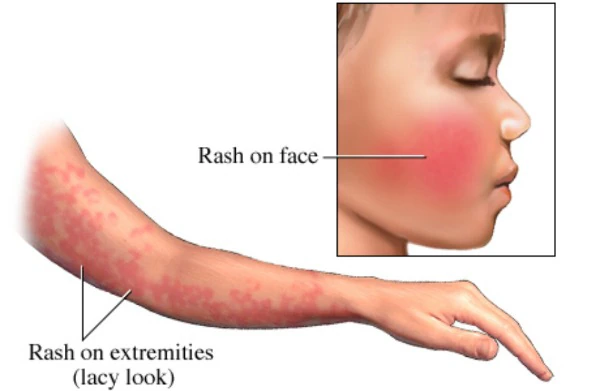Slapped cheek syndrome, also known as fifth disease or erythema infectiosum, is a viral infection caused by the human parvovirus B19. It is more common in children, but adults can also be affected. Here is an overview of the symptoms, causes, treatment, and prevention of syndrome:
Symptoms:
- Red “Slapped” Cheeks: One of the hallmark symptoms is bright red cheeks that appear as if the person has been slapped on the face.
- Rash: After a few days, a lacy, red rash may develop on the trunk and limbs, which can come and go for several weeks.
- Fever: Some individuals may experience a mild fever.
- Joint Pain: In adults, joint pain and swelling can be a symptom, especially in the wrists, knees, and ankles.
- Cold-like Symptoms: In some cases, individuals may experience mild cold-like symptoms, such as a runny or stuffy nose.
Causes:
Slapped cheek syndrome is caused by the parvovirus B19. It is highly contagious and spreads through respiratory droplets from an infected person. The virus is most contagious before the onset of the rash.
Treatment:
- Symptomatic Relief: There is no specific antiviral treatment for slapped cheek syndrome. Treatment mainly focuses on relieving symptoms.
- Rest and Hydration: Getting enough rest and staying well-hydrated are essential for recovery.
- Pain Relief: Over-the-counter pain relievers, such as acetaminophen or ibuprofen, may help alleviate discomfort and reduce fever.
Prevention:
- Hygiene: Practicing good hygiene, such as frequent handwashing, can help prevent the spread of the virus.
- Isolation: Individuals infected with it should avoid close contact with pregnant women and individuals with weakened immune systems.
- Vaccination: There is no specific vaccine for slapped cheek syndrome, but maintaining routine vaccinations can help prevent other infectious diseases.
It’s important to note that syndrome is usually a mild and self-limiting illness. However, pregnant women and individuals with compromised immune systems should consult with a healthcare professional if they suspect exposure or if symptoms arise. If someone suspects slapped cheek syndrome, it’s advisable to consult a healthcare professional for an accurate diagnosis and appropriate management.






























